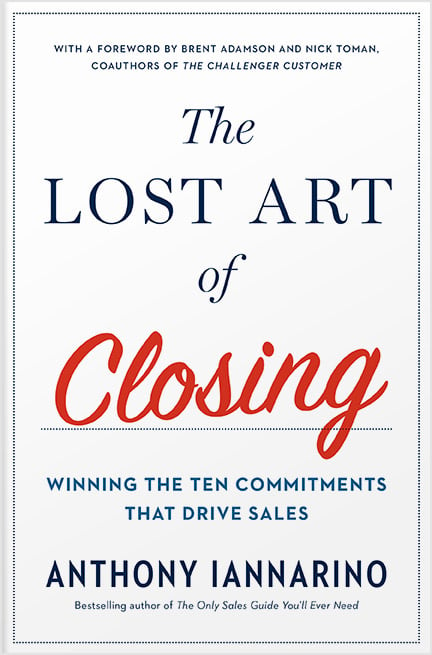The Gist:
- Many distractions take time and attention away from the one thing available to you to create value for your clients.
- The legacy approach to sales, one that focus on “why us,” are no longer helpful in early sales conversations.
- The greatest value you create emerges exclusively in the sales conversation.
The world of sales enablement and improvement is a cluttered and confusing collection of ideas, frameworks, methodologies, and technologies, all of which are valuable in the right context. With so many things competing for your time, attention, and money, though, it can be difficult to know what’s most important for your success in sales—or your team’s success in creating and winning opportunities. What follows is a case for why you should enable value creation and the only reliable tool available to you to when it comes to winning deals.

Destructive Distractions
As important as technologies are, they don’t create any intrinsic value for your clients. There is every reason to provide a sales force with the technology they need to succeed in their role, but tech tools contribute very little to a sales force’s ability to create and win new opportunities. Review your wins and losses over the last year and search for any deals you won because your client was impressed with your sales stack or lost because the salesperson carried an iDistract X instead of an iDistract X+.
In my view, most sales organizations are over-qualifying prospective clients, expecting them to be compelled to change before they have a conversation with a consultative salesperson, one with the ability to help the client understand what better results are available to them and why. Choose BANT or some other framework for qualifying a client and you will invariably ensure that your client has a miserable, value-eliminating experience, one they won’t care to repeat with the next sliver of a sales rep.
And then there are the ideas that, taken out of context, cause salespeople to harm themselves and their clients. The cringe-worthy idea that “sellers should sell the way that clients want to buy,” without any guidance on appropriate professional behaviors, causes salespeople to believe they should be obedient, compliant, good girls and boys. There is no value created by running errands for your prospective clients.
Much of what falls into these categories is a distraction is because it does little to improve the one thing available to you to create value for your clients, while also increasing their desire to buy from you.

The Only Thing Available to Create Value
While many tools, tips, and techniques are valuable in some way, none of them can compete with your first concern as a consultative salesperson. If you want to create and win new opportunities while providing your contacts with a different experience—one that creates greater value, develops a preference to buy from you, wins new deals, and delivers the better results your clients need—then your only reliable tool is the sales conversation.
No matter how old or how good your company is, it creates no value for your prospective client when it comes to understanding why their decade-old practice is suddenly failing. Logos on a slide deck may confirm your reputation and build a bit of trust, but they pale beside the value created in the sales conversation.
In much the same way, your latest product or service may be intriguing, fascinating, and even wicked cool, but they are rarely able to sell themselves without a salesperson engaging in a conversation with the prospective client. (If they could, you would need a vending machine, not a sales force.) No product can create value for the client before they buy it and begin executing a new solution. Because this is true, you are left with the sales conversation alone.

How and Where You Create Value
How do you create value for a client without relying on your company’s credibility and your solutions’ potential value? The answer, while simple, isn’t easy. You create value for your clients when you help them make the best decision for their company. The more you are capable of using the sales conversation to produce this outcome, the more value you create and the greater your chances of winning their business.
As far as your prospective clients are concerned, you are the best representation of what they should expect from your company. Your contacts are trying to discern if your company sent them someone who can engage in a conversation designed to help them:
- Understand the nature of their challenge and why they need to change now.
- Recognize the factors they are going to have to explore to make a good decision, and how they interact.
- Provide them with insights that replace their false assumptions with a higher-resolution lens through which to view their business and their decisions.
- Help them engage in all the conversations that ensure that they make a well-informed decision.
- Assist them in dialing in a solution that is perfectly tailored to their needs, is something they can execute, and will garner the support of their company’s leadership.
- Help them gain the support they need from a broad range of stakeholders with conflicting needs, some of whom will need help mitigating the repercussions of a decision to change.
Even this incomplete sample of important outcomes cannot be achieved with a conversation about your company or your products. What modern buyers consider valuable in the sales conversation is less and less about the tangible things that would have been enough in another decade. The conversation is more and more about helping your client make sense of their world and how best to make the changes necessary for creating better results, both now and in the future.
You would do well to spend more time and effort improving the competencies that would allow you to provide your prospective clients with a better experience during the sales conversation. No gadget or gimmick should compete with the one thing you have available to you to create and win new opportunities.
Do Good Work:
- What distractions have not proven to improve your sales results in a meaningful way?
- How do you create value for your clients when it comes to making the right decision for the results they need?
- In what area do you need to improve your ability to generate value-creating outcomes in the sales conversation?












.jpg?width=768&height=994&name=salescall-planner-ebook-v3-1-cover%20(1).jpg)


